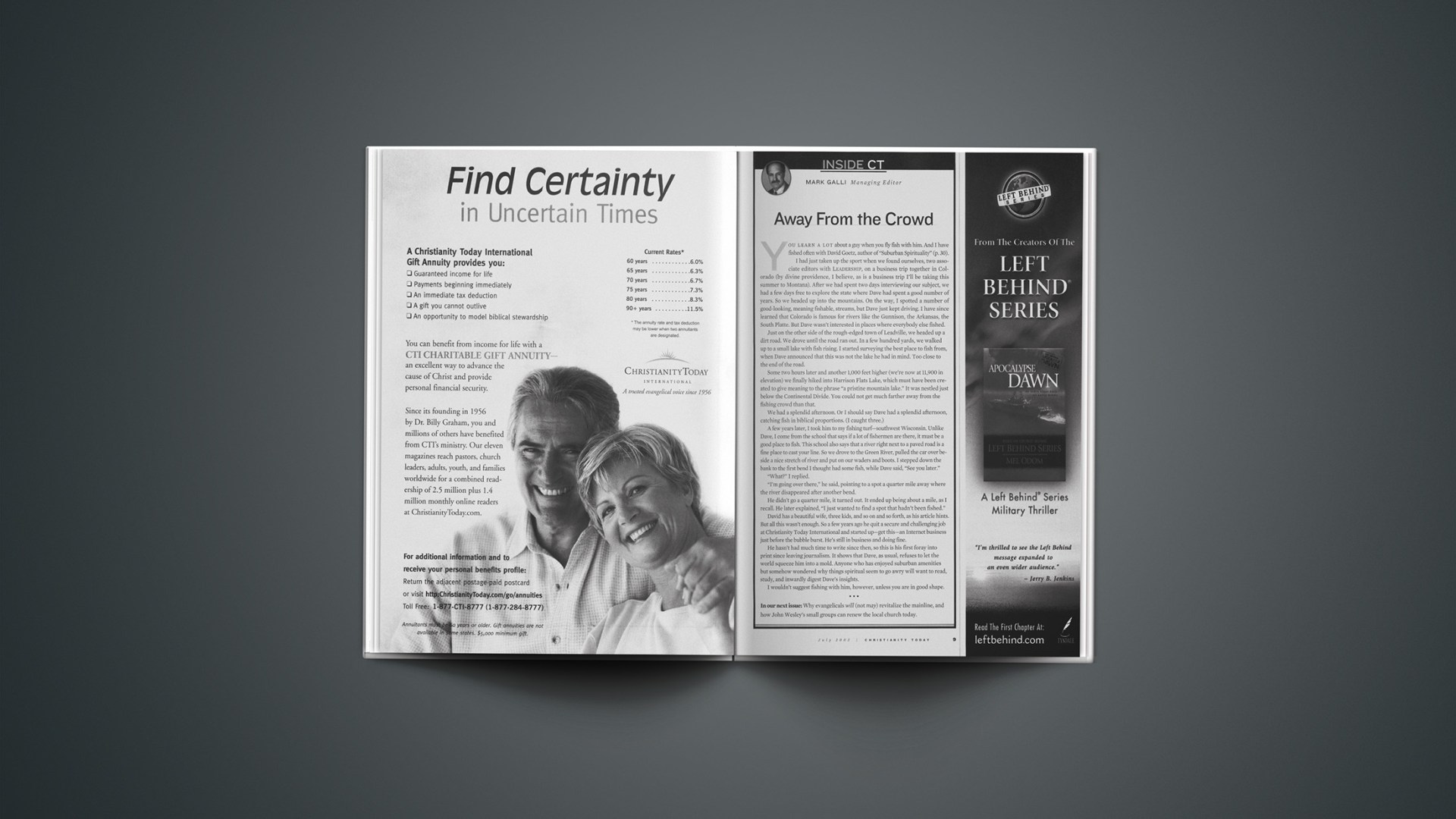You learn a lot about a guy when you fly fish with him. And I have fished often with David Goetz, author of “Suburban Spirituality” (p. 30).
I had just taken up the sport when we found ourselves, two associate editors with Leadership, on a business trip together in Colorado (by divine providence, I believe, as is a business trip I’ll be taking this summer to Montana). After we had spent two days interviewing our subject, we had a few days free to explore the state where Dave had spent a good number of years. So we headed up into the mountains. On the way, I spotted a number of good-looking, meaning fishable, streams, but Dave just kept driving. I have since learned that Colorado is famous for rivers like the Gunnison, the Arkansas, the South Platte. But Dave wasn’t interested in places where everybody else fished.
Just on the other side of the rough-edged town of Leadville, we headed up a dirt road. We drove until the road ran out. In a few hundred yards, we walked up to a small lake with fish rising. I started surveying the best place to fish from, when Dave announced that this was not the lake he had in mind. Too close to the end of the road.
Some two hours later and another 1,000 feet higher (we’re now at 11,900 in elevation) we finally hiked into Harrison Flats Lake, which must have been created to give meaning to the phrase “a pristine mountain lake.” It was nestled just below the Continental Divide. You could not get much farther away from the fishing crowd than that.
We had a splendid afternoon. Or I should say Dave had a splendid afternoon, catching fish in biblical proportions. (I caught three.)
A few years later, I took him to my fishing turf—southwest Wisconsin. Unlike Dave, I come from the school that says if a lot of fishermen are there, it must be a good place to fish. This school also says that a river right next to a paved road is a fine place to cast your line. So we drove to the Green River, pulled the car over beside a nice stretch of river and put on our waders and boots. I stepped down the bank to the first bend I thought had some fish, while Dave said, “See you later.”
“What?” I replied.
“I’m going over there,” he said, pointing to a spot a quarter mile away where the river disappeared after another bend.
He didn’t go a quarter mile, it turned out. It ended up being about a mile, as I recall. He later explained, “I just wanted to find a spot that hadn’t been fished.”
David has a beautiful wife, three kids, and so on and so forth, as his article hints. But all this wasn’t enough. So a few years ago he quit a secure and challenging job at Christianity Today International and started up—get this—an Internet business just before the bubble burst. He’s still in business and doing fine.
He hasn’t had much time to write since then, so this is his first foray into print since leaving journalism. It shows that Dave, as usual, refuses to let the world squeeze him into a mold. Anyone who has enjoyed suburban amenities but somehow wondered why things spiritual seem to go awry will want to read, study, and inwardly digest Dave’s insights.
I wouldn’t suggest fishing with him, however, unless you are in good shape.
•••
In our next issue: Why evangelicals will (not may) revitalize the mainline, and how John Wesley’s small groups can renew the local church today.
Copyright © 2003 Christianity Today. Click for reprint information.
Related Elsewhere
Also appearing today on our site:
Suburban Spirituality | The land of SUVs and soccer leagues tends to weather the soul in peculiar ways, but it doesn’t have to.
Religion in the ‘Burbs | An interview with R. Stephen Warner, sociologist of religion at University of Illinois at Chicago.
Dave Goetz is a former editor of Christianity Today sister publication Leadership. In 1997 he wrote the CT cover story, “Why Pastor Steve Loves His Job.”










